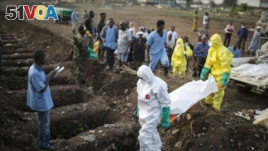Jul 29, 2018
As Sierra Leone recovers from the Ebola Epidemic of 2014-2016, the most widespread outbreak of the disease in history, the country's Ministry of Health and Sanitation is helping families to find the graves of those who perished.
With support from United States Government through the Centers for Disease Control and Prevention, or CDC, the Ministry and its partners have launched the Sierra Leone Ebola Database Family Reunification program.

Health workers carry the body of an Ebola victim for burial at a cemetery in Freetown, December 17, 2014.
The SLED program, as it is known, is based on information recorded during the epidemic by thousands of Sierra Leonean surveillance officers, burial team members, laboratory technicians, and data managers. The SLED Team of Sierra Leonean and CDC data managers was able to organize and collect more than 500,000 alerts, burial, and other patient records, creating the most complete collection of data from the Ebola epidemic.
The primary objectives of SLED are not only to locate the graves of those who died during the epidemic, but also to create a resource for public health research by providing secure data access via the CDC Research Data Center.
“With CDC support, we are proud to have the most comprehensive imaging of all efforts around the Ebola epidemic in Sierra Leone,” said Dr. Amara Jambai, Deputy Chief Medical Officer at the Ministry of Health and Sanitation.
Dr. Tushar Singh, U.S. CDC Country Director said that “U.S. Government support for the SLED project helps to advance relationship with the Government of Sierra Leone and to create a resource for research capacity building and future epidemic prevention.”
In the 1970s, the CDC first began working in Sierra Leone researching Lassa fever. In 2008, the agency expanded its reach with the U.S. President's Emergency Plan for AIDS Relief, building laboratory and surveillance capacity. As part of the 2014-2016 Ebola response, more than 700 CDC staff served on over 1000 deployments.
It was CDC's largest outbreak response ever in a single country. In 2015, a permanent CDC Country Office was established in Sierra Leone to focus on Global Health Security efforts.
The United States is proud to work with public and private sector partners in Sierra Leone to protect the people of Sierra Leone as they recover from the ravages of the deadly Ebola epidemic.